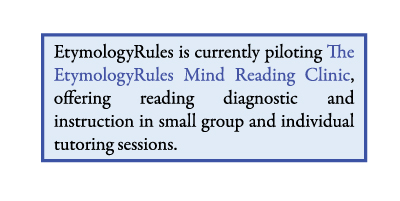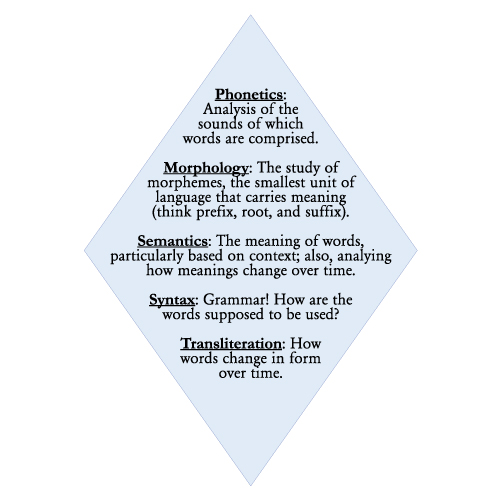Word Study
Reading is the process of constructing meaning from from printed language. Reading requires one to be able to recognize, analyze, and comprehend words. In addition, writing demands one to have a firm foundation in word knowledge in order to write fluently and express ones ideas with ease. Thus, readers must be word conscious through word study instruction, which focuses on phonics, spelling, and vocabulary to build word recognition, fluency, and comprehension skills. With word study, students do not engage in rote memorization of word spellings, but rather learn to sort, analyze, compare, and contrast the words in categories based on orthographic similarity. For example, play, brain, bran, pack, stamp, and game are all words that contain the a vowel sound, but brain and game are long a vowel words, while bran and stamp contain the short a vowel sound.
brain bran
game stamp
play pack
Phonological Awareness, Phonemic Awareness (PA) and Concept of Word in Text (COW-T) for Emergent Readers and Writers
COW-T and phonemic awareness are two critical aspects of reading development. (National Reading Panel, 2000). Phonological awareness is the ability to identify and distinguish between various sound segments in speech, while phonemic awareness (an aspect of phonological awareness) is the ability to distinguish between individual sounds (phonemes) in a word. COW-T is the ability to accurately track text while reading from memory. COW-T is dependent on phonemic awareness and letter-sound knowledge, as both help students to find words on a page. Word study instruction incorporates picture sorting, games, and hands-on activities with interactive read-alouds and shared writing to provide readers with a complete literacy diet to foster emergent reading and writing skills.
 Phonics and Sight Word Vocabulary for Beginning and Transitional Readers and Writers
Phonics and Sight Word Vocabulary for Beginning and Transitional Readers and Writers Phonics is the systematic correspondence between letters and sounds taught to beginning and transitional readers and writers to develop word attack and word recognition skills. Beginning readers lack fluency and read choppily because they use most of their mental energy to decode words rather than make meaning of the text. They require systematic instruction to develop their sight word vocabulary, or the words that readers can instantly identify. We implement phonics instruction utilizing both a systematic and embedded, as well as analytic approach. That is, readers engage in word study activities in a sequential manner as well as when word features arise in authentic reading experiences.
 Syllabic Analysis and Affixes for Intermediate Readers and Writers
Syllabic Analysis and Affixes for Intermediate Readers and WritersAs students build fluency skills, they are able to read longer text passages and focus on meaning over decoding because they have built up sight word knowledge. However, texts now begin to incorporate multisyllabic words, particularly in informational texts for a variety of content areas. Intermediate writers are able to write with ease and a strong sense of voice. Thus, word study at the intermediate stages focuses on sorting and games to develop students' syllabic analysis skills. Syllabic analysis is the ability to break a word into its given syllables to properly In addition, they begin to connect spelling or orthographic features in words to their meaning, identifying how suffixes help the reader determine the word's part of speech and thus its function in a text. Lastly, this stage of word study teaches readers about stress and accented syllables to aid them in their spelling and word attack.
Derivational Relations for Advanced Readers and Writers
The advanced reader and writer is at the derivational relations stage of word study and are now fully engaged in morphemic analysis instead of syllabic analysis (previous stage). At this point, they begin to study root words and affixes as a means of spelling and vocabulary instruction. Often times, root word meanings (reflecting the words original meaning) are not reflected in the modern-day meaning of the word. Thus, students benefit from studying how words change in meaning over time. Etymology is a central focal point in this stage of word study, and the derivational relation stage is the culmination of the orthography, semantics, and morphology of the English language.
